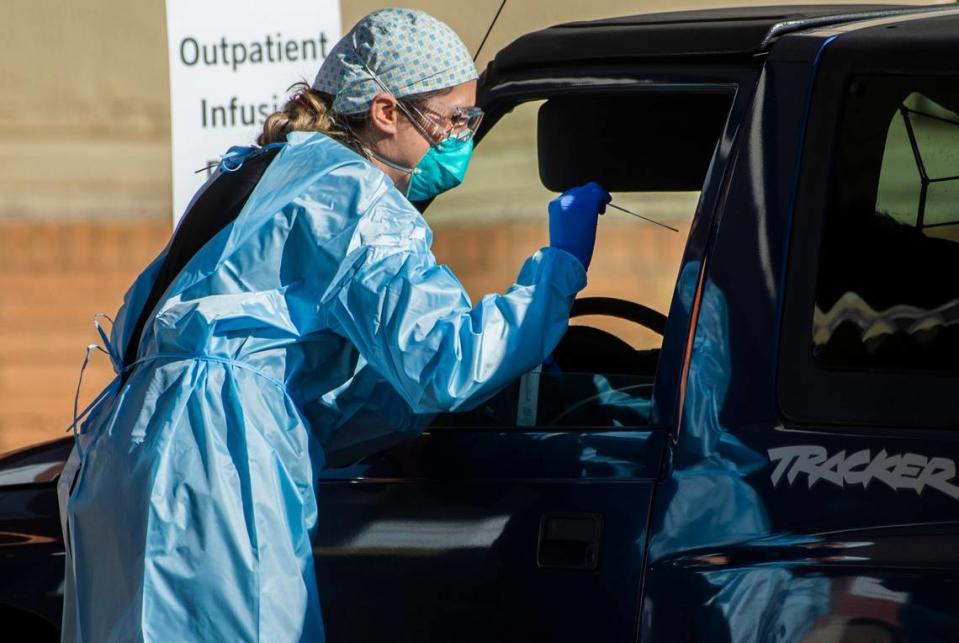Sacramento County health lab can now test for COVID variants, including omicron
The Sacramento County health office’s laboratory recently added the capacity to test for variants of the virus that causes COVID-19, giving a boost to local efforts to monitor for omicron, a variant of concern detected in California for the first time this week.
The lab in the past couple of weeks began implementing that process, known as whole genome sequencing, county health officer Dr. Olivia Kasirye said during a call with reporters Thursday.
“We’ve been working on this for a while, but it does require a lot of training,” Kasirye said. “In order to be able to identify the variant, you have to do the whole genome sequencing. Being able to do it in-house increases our ability to be able to do surveillance.”
Prior to the training, the county had sent specimens to a state-run lab for variant sequencing, adding another step that lengthened the process and required additional resources.
Not all positive coronavirus test specimens are sequenced to look for variants.
“As we learn more (about omicron), we are also providing that information to our health care providers in order to decide which specimens to prioritize,” Kasirye explained.
“Definitely at this time, if there is a history of travel, those are specimens we are interested in.”
The omicron case detected recently in San Francisco came in someone who had recently returned from South Africa. Kasirye said those who have recently returned from international travel should consider getting tested.
Kasirye said the local health office also prioritizes positive tests linked to outbreaks, as well breakthrough infections.
She said health officials hope to know “within the next couple of weeks” how omicron may impact vaccine efficacy, and whether it is more infectious or produces more severe illness than delta or other variants. Kasirye noted that nearly all cases sampled for variants continue to be identified as delta, which has been California’s dominant strain since summer.
“So far, the indications we have is that the people that have been identified have mild symptoms, but our understanding is they’re tending to be younger,” Kasirye said, referring to confirmed omicron cases around the globe. “So I think there’s a lot we’re still learning.”
No shortage of vaccine and booster supply
Kasirye emphasized the continued importance of getting vaccinated, and also said travel, holiday gatherings and even holiday shopping could present risks of transmission, and noted that the county still requires masks in indoor public settings.
“Our hope, of course, is that our vaccines will hold up,” Kasirye said. “That’s why we are telling people, there are things you can do right now to continue to protect yourself,” such as getting vaccinated and boosters.
Hannah Aalborg, a county health program coordinator, said on Thursday’s call that recent county-run clinics are seeing about a 60-40 split — roughly 60% of patients are receiving booster doses, while 40% are getting initial doses.
Recent California Department of Public Health data show that just over one-third of Sacramento County adults who are eligible for a booster — meaning they are at least six months beyond their second dose of Pfizer or Moderna, or two months beyond their dose of Johnson & Johnson — have received one, which is slightly above the state average of around 31%.
State and federal health officials now say that all adults who have waited the appropriate two- or six-month period should get a booster.
Aalborg said that, though the U.S. Centers for Disease Control and Prevention has imposed ordering thresholds, vaccine supply continues to outpace demand in the Sacramento area.
“There isn’t a supply issue,” Aalborg said, adding that first-dose and booster appointments can be made through a variety of avenues including county-partnered clinics, retail pharmacies and health providers. Appointments can be found and scheduled via myturn.ca.gov.
Kasirye called it “hard to predict” when omicron might be detected in the Sacramento area, but said “it is expected that this variant will spread.”
“We know that a lot of people are traveling back and forth. It is the holiday season. We know it’s going to happen at some point, so we need to continue to be vigilant.”


 Yahoo Movies
Yahoo Movies 